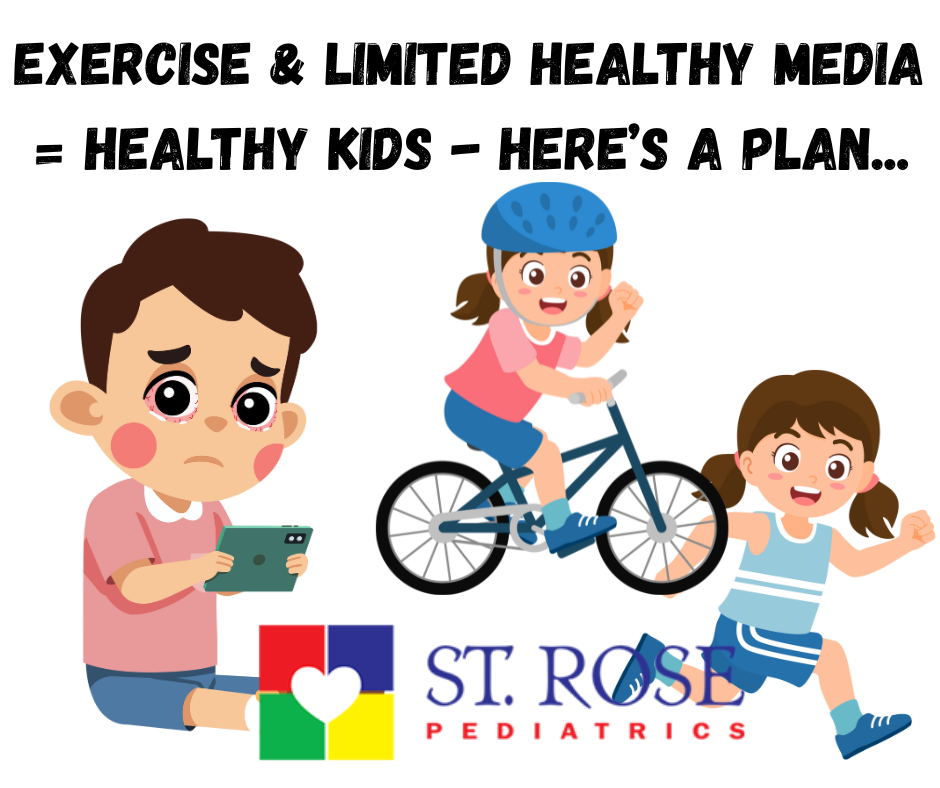EXERCISE & LIMITED HEALTHY MEDIA = HEALHY KIDS
MAKE YOUR HEALTHY FAMILY MEDIA PLAN ~ TEMPLATE HERE

The body content of your post goes here. To edit this text, click on it and delete this default text and start typing your own or paste your own from a different source.
Family Media Plan
Media is everywhere, and managing it all can be tough. Creating a Family Media Plan can help you and your children set media priorities that matter most to your family. Come back to revise your plan as often as you need to, such as at the beginning of each school year or during summer and holiday breaks.
Here's how it works
Since media habits are different for every household, the Family Media Plan can be customized to meet your family's needs. Make a full plan, or just choose a few parts that matter the most to your family.
The Family Media Plan includes:
- A list of media priorities to choose from
- Practical tips to help make the plan work
- Why it's important
- The ability to print or share your finished plan
- The option to save your plan and return as often as you'd like to make changes.
STUDIES SHOW:
Regular exercise and physical activity offer significant mental health benefits for children, including improved mood, reduced anxiety and depression, and better cognitive function. These benefits extend to children with and without mental health conditions. Even low-to-moderate intensity activities, like walking, can have positive impacts.
Specific benefits include:
- Improved Mood:
- .
- Opens in new tab
- Exercise releases endorphins, which have mood-boosting effects.
- Reduced Anxiety and Depression:
- .
- Opens in new tab
- Physical activity can be a powerful tool in managing and preventing anxiety and depression in children.
- Enhanced Cognitive Function:
- .
- Opens in new tab
- Exercise can improve attention, memory, and processing speed, particularly helpful for children with ADHD.
- Better Classroom Behavior and Academic Performance:
- .
- Opens in new tab
- Studies show that physically active children tend to exhibit better classroom behavior and academic achievement.
- Increased Self-Esteem and Confidence:
- .
- Opens in new tab
- Engaging in physical activity, especially team sports, can boost a child's self-esteem and confidence.
- Improved Social Skills:
- .
- Opens in new tab
- Team-based activities can help children develop social skills, learn to cooperate, and manage emotions like disappointment.
- Reduced Risk of Mental Health Disorders:
- .
- Opens in new tab
- Research suggests that higher levels of physical fitness, including cardiorespiratory fitness and muscular strength, may be associated with a lower risk of developing mental health disorders like anxiety and depression.
What Parents Can Do:
- Make it fun: Encourage children to participate in activities they enjoy, whether it's playing games, dancing, or sports.
- Be active role models: Lead by example by engaging in physical activity yourself.
- Make it a family affair: Go for walks, play active games together, or explore nature trails as a family.
- Find opportunities: Consider after-school activities, sports teams, or community programs.
- Start small and be consistent: Even short periods of physical activity can have a positive impact.
- Focus on enjoyment: Prioritize activities that children find fun and engaging rather than focusing solely on high-intensity or competitive sports.
DON'T FORGET!
Schedule your Back to School Physical with your pediatrician now.
As July is the ideal time to schedule back-to-school physicals, it
is recommended that you schedule your child's appointment with their
pediatrician now to ensure you can secure an appointment time.
Scheduling the physical early, especially during the summer
months, can help you to avoid the rush of the late summer season, when doctors'
offices tend to be busiest. This means you'll have more flexibility in choosing
a convenient appointment time for you and your child.
Another benefit of scheduling early is that it allows ample time
for any necessary follow-up care or testing that may be identified during the
physical. Catching potential health issues early, such as vision problems or
scoliosis, can make a difference in a child's overall well-being and academic
success.
Note: If your child participates in sports, remember to mention
this when you schedule their appointment. A sports physical, which is often
combined with a back-to-school physical, may be required by their school or
athletic program.
Back-to-school physicals are essential health check-ups that ensure students are healthy and ready for the school year, especially before starting kindergarten, middle school, or high school. These physicals are also recommended for students participating in sports. They are typically comprehensive, including a review of medical history, vital signs, vision and hearing screenings, and may include vaccinations.
What to Expect During a Back-to-School Physical:
- Medical History Review: The provider will discuss your child's past illnesses, allergies, and family health history.
- Vital Signs: Height, weight, blood pressure, and pulse will be measured.
- Physical Exam: The provider will check your child's heart, lungs, ears, eyes, nose, throat, and musculoskeletal system.
- Vision and Hearing Screening: Simple tests can identify vision or hearing changes that may affect schoolwork.
- Immunizations: The provider will review your child's immunization records and administer any necessary vaccines.
- Sports Physicals: If your child is participating in sports, the provider will assess their physical fitness and readiness for athletic activities.
- Mental Health Screening: The provider may also screen for any potential mental health concerns.
Why are they important?
- These physicals help identify potential health issues early on, allowing for timely intervention and treatment.
- Meet school requirements:
- Most schools require proof of a recent physical exam before a child can attend classes or participate in sports.
- Promote healthy habits:
- The provider can offer guidance on nutrition, exercise, and other healthy habits to help your child thrive.
When to schedule:
- It's best to schedule back-to-school physicals a few weeks before the start of the school year to avoid the last-minute rush.
- Many urgent care centers offer walk-in appointments for physicals.
What to bring:
- Updated vaccine records: Make sure to bring your child's immunization records.
- School or sports forms: Bring any forms that need to be completed by the provider.
- Medication list: Bring a list of any medications your child is currently taking
· "Pediatrician Las Vegas"
· "Pediatric doctor near me"
· "Children's health clinic Las Vegas"
· "Las Vegas pediatric services"
· "Best pediatrician Las Vegas"
· "Top pediatricians near me Las Vegas"
· "Pediatric care Las Vegas"
· "Doctor for kids Las Vegas"
· "Infant and toddler care Las Vegas"
· "Newborn pediatrician Las Vegas"
· "Child vaccinations Las Vegas"
· "Well-child visits Las Vegas"
· "Sick visits Las Vegas"
· "After-hours pediatric care Las Vegas"
· "Developmental screenings Las Vegas"
· "ADHD management Las Vegas"
· "Asthma management Las Vegas"
· "Pediatric urgent care Las Vegas"
· "Pediatrician near me Las Vegas"
· "Pediatrician [specific neighborhood/zip code] Las Vegas"
· "Pediatric clinic Henderson NV" (if applicable)
· "Pediatric doctor [specific hospital affiliation] Las Vegas"
· "Pediatrician reviews Las Vegas"
· "Trusted pediatrician Las Vegas"
· "Board certified pediatrician Las Vegas"
· "Pediatrician referrals Las Vegas"
· "Pediatrician accepting new patients Las Vegas"
· "Pediatrician vaccine policy Las Vegas"
· "Holistic pediatrician Las Vegas"
· "Family-centered pediatric care Las Vegas"
· "Pediatrician with extended hours Las Vegas"

